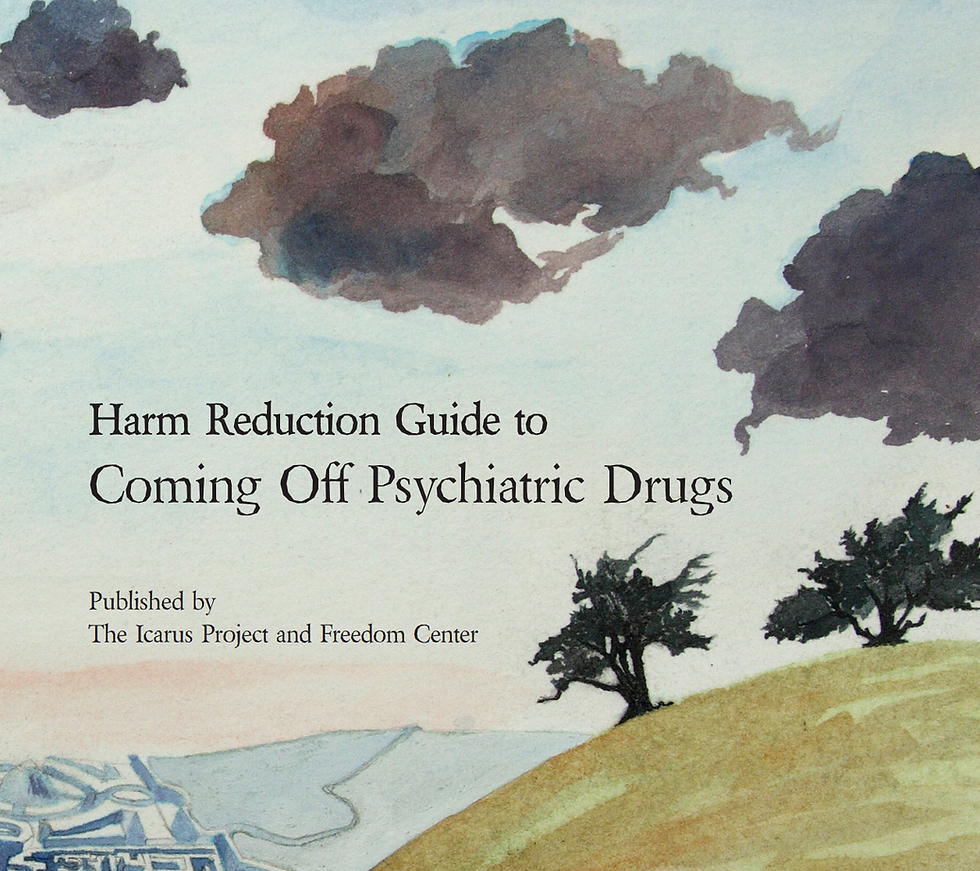Mother's Little Helper
- Antonia Schachter

- Feb 24, 2021
- 3 min read
Updated: Mar 2, 2021
I am a long-term antidepressant, benzodiazepine, and antipsychotic medication user. I used to feel a lot of guilt about this as if I am morally weak for taking them.

I don't remember the first time my mother gave me a small piece of Valium to alleviate a stomachache. When I was prepubescent, I would lay curled in the fetal position with spasms in my gut that could last an entire day. The Valium worked wonders, the pain was gone within a half-hour, and how my mother praised its anti-spasmodic qualities!
When my parents divorced, and I was transitioning to Junior High School, mom was happy to ease my anxiety with her valium. She had a perpetual prescription for Klonipin (Benzodiazepine) until the day she died.
Like so many women, my mother was happily employing the help of Valium and then Klonopin for life's stresses with remarkable success! In 1955, Pharmaceutical Companies found their magic bullet for everyday anxiety- Hoffmann-La Roche identified the first benzodiazepine, chlordiazepoxide (Librium). By 1960, the company marketed it as Librium. Valium (diazepam) followed in 1963.
Valium quickly gained immense popularity with doctors and patients; between 1969 and 1982, it was the most prescribed drug in the US. Sales peaked in 1978 with more than 2.3 billion pills sold that year!
After my first child's birth in 1991, I was hit with acute anxiety bordering on constant panic. My Ob-gyn attributed it to hormone fluctuations that occur after giving birth, a phenomenon called Postpartum depression (PPD).
I remember crying on the phone to my therapist (yes, therapy!), my chest heaving, and tears streaming.
"I can't take care of my baby like this! I can barely stand."
Indeed, it was a visceral kind of anxiety that lived right in my gut.
And in her inimitable style, she replied confidently, "Yes, you can and you will."
My mother numbed her feelings and thought nothing of giving them to her children so we, too, could feel better faster. I remember her doling out quarter-sized bits of pills and later halves. It always gave the promised relief. My mother couldn't bear her pain, let alone her childrens'. I swore never to succumb to such emotional weakness.
Pride goeth before a fall.
The problem was I had already learned to rely on those pills my mother happily shared even though I hadn't used them in years. I was bereft of any coping skills for managing intensely felt emotions. I never needed them before. I just took a pill. I had absolutely no idea how to just get on with things when I really could barely stand.
My well-meaning therapist had few tools to offer me beyond our weekly 45 minutes and talking me down from my peaks of hysteria. Mindfulness, meditation, and other eastern wellness philosophies were not widely taught, and self-help was a nascent industry compared to today.
When I sought out the help of my Ob-gyn, he acted like what I'd been going through was routine! Just a little PPD.
"Six months on meds, and you'll be fine," and then he referred me to a psychiatrist. He seemed so damned proud of himself; you'd think he invented the medication himself.
I was a little confused that he wasn't going to prescribe some kind of hormone therapy. Suddenly, I was faced with the decision to take psychiatric medication. I just didn't have the coping skills, resources, or experience to attempt to weather this on my own, as my psychotherapist suggested. It seemed to be my only option. But, I admit, I felt defeated.
It is an essential part of my story that I understood on some level that my mother was addicted. I didn't understand that her addiction was fueled by a dangerous and widely used psychiatric medication, not by emotional or moral weakness.
Please use the resources on this site to research further and always, please leave a comment.
Historical side note: When I saw my psychotherapist in 1991 she was an independent therapist and Psychopharmacology was in its youth. Today, it is most common to find therapists working in group settings headed up by a psychiatrist who feeds them referrals.





Comments